What we’re up against.
Typical comments on the $15 minimum wage in the May 15, 2014 Tampa Tribune.
- “The notion that any menial task should pay a living wage is only in the minds of liberals like you.”
- “If someone is over 30 years old and still making minimum wage, it is no ones fault but their own. period.”
- “These jobs like waiters, servers, bartenders and such were for people to make a extra income. They were not there to raise a family.”
- “The fact that 3/4’s of the people that work at these establishments don’t speak a word of English tells you why this problem even exists!!”
- “You want to make more money, become a CEO.”
The St. Petersburg employment picture:
| Total St. Pete Population | 249,000 |
| Total Workforce | 133,506 |
| Sales/marketing | 17,650 |
| Management support | 5,874 |
| Clerical support | 31,298 |
| Health care | 2,742 |
| Food and beverage | 8,827 |
| Personal services | 3,636 |
| Protective services | 3,290 |
| Agricultural | 1,389 |
| Laborers | 3,427 |
| Number in Low-paying Professions | 78,133 |
| That Percentage of Workforce | 58.5% |
- Per Wikipedia: Florida has the eighteenth highest per capita income in the United States of America, at $21,557 (2000). Its personal per capita income is $30,446 (2003).
- The average annual salary for Floridians ranks No. 32 nationwide, according to a new On Numbers analysis of Bureau of Labor Statistics data.
- Florida lost 17,900 jobs from April to May, which was the largest over-the-month decrease in employment in the U.S., according to a report from the Bureau of Labor Statistics.
What does the above tell us?
Even allowing for the fact that not all of the workers in the named categories in the table above are at the bottom of the wage scale, one can still say that about half of St. Pete’s workforce is, according to the commenters above, undeserving, doesn’t have families to raise, doesn’t speak English, and lacks the gumption to become CEO’s.
We in the Green Party do not accept this. We demand a $15/hour minimum wage for all Florida workers, without exemptions or delays. Period.
Florida State Constitution, Article X, Section 24.
“(a) PUBLIC POLICY. All working Floridians are entitled to be paid a minimum wage that is sufficient to provide a decent and healthy life for them and their families, that protects their employers from unfair low-wage competition, and that does not force them to rely on taxpayer-funded public services in order to avoid economic hardship.
“(f) … This amendment provides for payment of a minimum wage shall not be construed to preempt or otherwise limit the authority of the state legislature or any other public body to adopt or enforce any other law, regulation, requirement, policy or standard that provides for payment of higher or supplemental wages or benefits, or that extends such protections to employers or employees not covered by this amendment.”
Report from the front.
On Saturday, June 21, we attended a forum hosted by Socialist Alternative (SA) on the fight for the $15 minimum wage, which will go into effect in Seattle on April 1, 2015. Just back from Seattle, SA’s Ryan Wiggins, reported on the successful struggle for the $15 minimum there, and the election of SA’s Kshama Sawant to Seattle’s City Council. “It was a huge victory, but showed the need to build an even more powerful mass movement,” stated Wiggins. “And it showed that elective office can build and strengthen mass movements.”
Wiggins, a veteran of the Occupy movement, related how the victory was the result of the sometimes fractious alliance of a direct grassroots movement, organized labor — particularly SEIU, and Democratic Party politicians. The opening shot was a walkout by Seattle fast food workers last Spring, and it gathered momentum as labor and political leaders got behind the $15 minimum. Progressives were excited and, frankly, stunned when Indian-born Sawant, a leader in the fight for $15, ran a grassroots campaign that elected her to the City Council last November. A veteran of the Occupy movement and a proud SA member, Sawant had pushed for the strongest possible measure, with no delays in implementation, no exceptions for various classes of businesses, no “training” wages, no “tip credits,” and no special youth rates.
In addition to $15 Now, organized labor, community organizations and Democratic Party politicians formed their own coalition, $15 for Seattle, to push the campaign as well, after polling showed 68% support for the $15 minimum in every Council district in the city.
The coalition broke down, Wiggins explained, as the Mayor’s Income Inequality Advisory Committee put forward a plan that included all the delays, exemptions and watering-downs that Sawant and $15 Now had opposed. $15 Now continued to press ahead with its own ballot initiative, holding that if the voters directly passed a stronger measure, that would become law and would not be subject to being gutted by City Council.
From the June 6 Counterpunch:
“During the course of the campaign to raise the minimum wage, SA [Socialist Alternative] and $15 Now were offered mountains of advice and some criticism as well on how to conduct the struggle. They were too radical, too sectarian, too controlling, too uncompromising, too inexperienced, and not inclusive enough. They were told they should follow the time-honored method of forming the widest possible coalition with every labor and liberal leader that would sit with them.
“But though they participated in the “$15 for Seattle” labor coalition, they insisted on running $15 Now as a campaign, and one under the leadership of SA and a few close allies. They welcomed other activists with similar views to work with them on a democratic basis, and they went out of their way to get the widest possible participation of ordinary workers, students, and others. But they would not surrender the campaign to leadership from outside forces, no matter what their supposed size and prestige. And they were right.
“Had they done so, the inevitable result would have been that their efforts, rather than gaining strength from the participation of other forces, would have been diluted. The leadership of the campaign would have had to spend time in useless meetings with people and organizations who had nothing to offer but negotiations with a Mayor and City Council on which pro-business compromise they should make, as indeed other political forces did. That in turn would have hindered their efforts, both politically and organizationally to mobilize participation in the struggle from the people of Seattle in general, and low-wage workers and students in particular.”
Following Wiggins’ p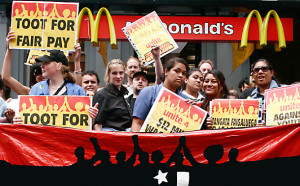 resentation, the dozen-plus folks mainly from Tampa and St. Petersburg discussed how to carry the fight into the West Coast of Florida. Should we start in Tampa, in St. Petersburg, or both? Ballot initiative? There have been local actions in the area’s fast-food industry. The assemblage was clearly committed to pursuing the issue, inspired by the success in Seattle, where the political makeup is similar to St. Petersburg’s. (Newly-elected liberal Mayor Rick Kriseman and 6 of 8 City Council members are Democrats.) Kriseman is currently offering city workers a 2% raise, but the Florida Public Service Union (FPSU), connected with SEIU, is asking the city for a $15 per hour minimum wage for all city workers, some of whom earn as little as $9.12 per hour.
resentation, the dozen-plus folks mainly from Tampa and St. Petersburg discussed how to carry the fight into the West Coast of Florida. Should we start in Tampa, in St. Petersburg, or both? Ballot initiative? There have been local actions in the area’s fast-food industry. The assemblage was clearly committed to pursuing the issue, inspired by the success in Seattle, where the political makeup is similar to St. Petersburg’s. (Newly-elected liberal Mayor Rick Kriseman and 6 of 8 City Council members are Democrats.) Kriseman is currently offering city workers a 2% raise, but the Florida Public Service Union (FPSU), connected with SEIU, is asking the city for a $15 per hour minimum wage for all city workers, some of whom earn as little as $9.12 per hour.
Concrete plans were left up in the air, but SA is committed to building a workers party and running candidates, along with the fight for $15. We pointed out that the Green Party has ballot status, and there might be ways we could work together on the electoral front. One possibility might be ballot initiatives. The SA organizers were definitely interested in pursuing the relationship.
The Empire Strikes First.
The legal situation is confusing. Last year the Florida state legislature passed an ALEC-sponsored HB 655, which ostensibly forbids cities or counties from enacting their own minimum wage laws. (ALEC has been sponsoring such bills across the country.) Statute 218.077(2) states:
“Except as otherwise provided in subsection (3), a political subdivision may not establish, mandate, or otherwise require an employer to pay a minimum wage, other than a state or federal minimum wage, to apply a state or federal minimum wage to wages exempt from a state or federal minimum wage, or to provide employment benefits not otherwise required by state or federal law.”
Yet as stated above, Article X, Sections 24(a) and 24(f) would seem to require that workers are entitled to be paid “a decent and healthy life for them and their families,” and that the Constitution’s Section X “shall not be construed to preempt or otherwise limit the authority of the state legislature or any other public body to adopt or enforce any other law, regulation, requirement, policy or standard that provides for payment of higher or supplemental wages.”
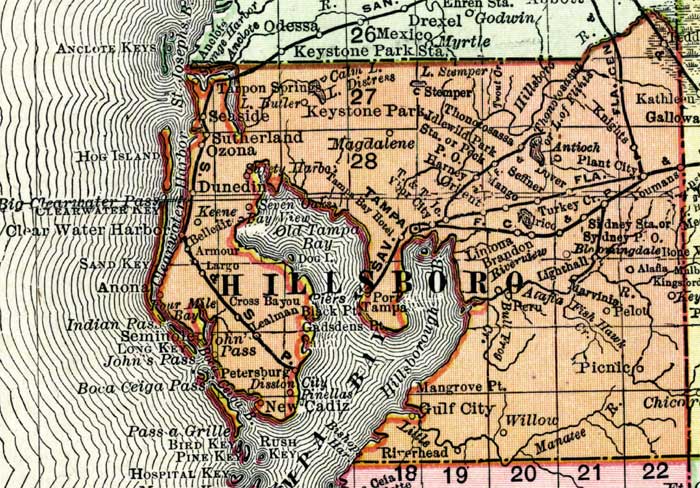 This requires further investigation. Could we unite around the concept of “living wage,” and bypass the legislature’s preemption? But organized labor, a key element of the fight for the $15 minimum, seems to be cowed by 218.077. (Is there a lawyer in the house?) But …
This requires further investigation. Could we unite around the concept of “living wage,” and bypass the legislature’s preemption? But organized labor, a key element of the fight for the $15 minimum, seems to be cowed by 218.077. (Is there a lawyer in the house?) But …
“… 15 in Seattle is only the beginning.
We have an entire world to win.” — Sawant
Indeed. Something is happening here, Mr. Jones, and the media and the legislature and the corporate powers don’t know what it is. They just know what they don’t like.
Actually, this has been a long time a’brewing, eight years of Bush, six of Obama, with no relief in sight. People are driven from their homes, but they are rendered invisible. Some strikes against McDonald’s and other fast-food chains, some rumblings from the liberal politicians, tears shed by the U.S. left, yes, the unions were beginning to stir. Corporations like Kia Motors and Florida’s C1 Bank have raised their minimum wages, and while one might think they had been touched by the hand of God, we suspect that other forces were at work. What lit the spark big-time was Kshama Sawant and her organization, Socialist Alternative, recounted earlier.
SA represents something new on the left, and it is worth going into some historical background to grasp their significance. Their ostensible tradition is Marxist, but they stand that tradition on its head. First, the so-called “hard” left has been strategically oriented to organized labor. If only some particular left organization could take over the unions, they would have at their disposal the power of the strike, the power to shut down the means of production. If only. But they can’t.
The account from Counterpunch quoted above tells the typical sad story. SEIU, one of the most liberal and active unions, used SA and the $15 Now coalition SA had organized, to get things going. Then, when it came time to cut their deals with the Democratic Party and the business community, $15 Now and SA got the axe for wanting to press forward independently with a ballot initiative. That’s who organized labor is, and that’s what they do.
Green and Red New Deals.
Now look at typical left programs. Union demands head the list, and community needs get mentioned much farther down. Then look at SA’s program. They lead with:
- Create living-wage union jobs for all the unemployed through a massive public works program to develop mass transit, renewable energy, infrastructure, healthcare, education, and affordable housing.
- Free, high quality healthcare for all. Replace the failed for-profit insurance companies with a publicly funded single-payer system as a step towards fully socialized medicine.
- No budget cuts to education & social services! Full funding for all community needs. The federal government should bail out states to prevent cuts and layoffs. A massive increase in taxes on the rich and big business, not working people.
- Raise the federal minimum wage to $15/hour, adjusted annually for cost of living increases and regional differences, as a step towards a living wage for all.
- A minimum guaranteed weekly income of $600/week for the unemployed, disabled, stay-at-home parents, the elderly, and others unable to work.
- Stop home foreclosures and evictions. For public ownership and democratic control of the major banks.
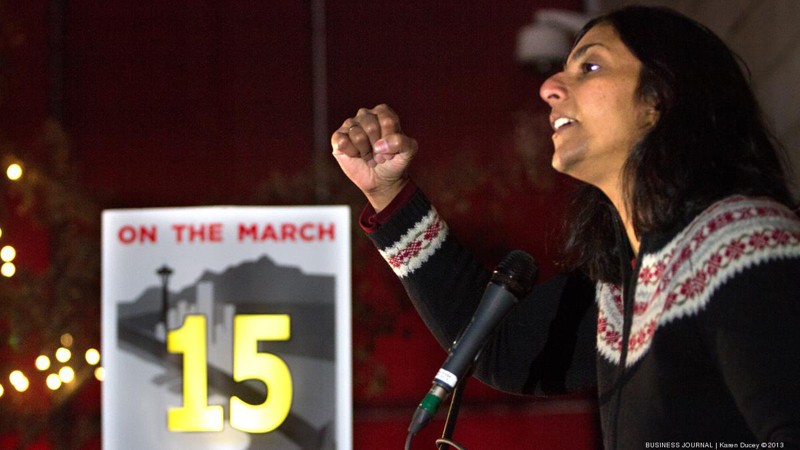
Sawant.
Human needs are put first. Jobs, healthcare, full funding for all community needs, $15/hour minimum wage, guaranteed income for the unemployed, stop foreclosures. The traditional demands are there, and good ones they are. But the sequence is significant. Even a casual glance would suggest that their orientation is remarkably similar to Jill Stein’s Green New Deal.
The SA/Green relationship is one that needs to be carefully nurtured. In 2012, when most of the left was getting into line for Obama or wallowing in sectarian irrelevancy, SA wrote:
“Socialist Alternative is calling for a break from two parties of the 1% and for the creation of new, broad party to provide a fighting voice for working people. In this election, we are urging a vote for Jill Stein of the Green Party for president, in order to register the strongest possible protest vote against the two-party system … While not a socialist, Stein stands clearly on the side of working people on every key issue facing our country. She refuses corporate donations and has used her campaign to support the struggles of ordinary people fighting injustice
On June 2, 2014, the SA site wrote:
“While many Left Forum speakers lamented the continued weakness of the U.S. left, the election of Kshama Sawant and the $15/hour minimum wage victory in Seattle were repeatedly raised as points of hope. Stanley Aronowitz, the central organizer of the Left Forum and opening speaker, pointed toward Socialist Alternative’s victory as the key example of the ‘good news.’”
She was introduced by Glen Ford, executive editor of Black Agenda Report (whose co-editor Bruce Dixon is co-chair of the Georgia Green Party), who “praised the role of Socialist Alternative’s leadership in the struggle to win a $15/hour minimum wage in Seattle. [Socialist Alternative has] doubled its membership since Sawant’s election.”
The 3rd wave.
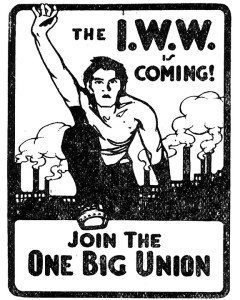 Third wave unionism is something that has been lost in the mists of time, but here’s a quick rundown. The First Wave was the skilled craft workers, mainly organized by the American Federation of Labor (AFL). They refused to organized the often foreign-born, unskilled workers in steel, auto, rubber and other heavy industry, in fact were openly hostile to the industrial workers, whose foremost champions were the Communist Party and the IWW. The Second Wave was of those industrial workers, succeeding in the 1930’s with the formation of the Congress of Industrial Organizations (CIO). But that left millions upon millions of workers still unorganized, sharecroppers, service workers, agricultural workers — most of the workforce, to say nothing of the unemployed. Despised as the “lumpenproletariat.” There were stirrings of a Third Wave, led by organizations like SEIU, the United Farm Workers, etc.
Third wave unionism is something that has been lost in the mists of time, but here’s a quick rundown. The First Wave was the skilled craft workers, mainly organized by the American Federation of Labor (AFL). They refused to organized the often foreign-born, unskilled workers in steel, auto, rubber and other heavy industry, in fact were openly hostile to the industrial workers, whose foremost champions were the Communist Party and the IWW. The Second Wave was of those industrial workers, succeeding in the 1930’s with the formation of the Congress of Industrial Organizations (CIO). But that left millions upon millions of workers still unorganized, sharecroppers, service workers, agricultural workers — most of the workforce, to say nothing of the unemployed. Despised as the “lumpenproletariat.” There were stirrings of a Third Wave, led by organizations like SEIU, the United Farm Workers, etc.
But that movement was stillborn. True, they were hard to organize, as they didn’t have their hands on the “point of production” to shut down entire industries. But they were also abandoned as the AFL-CIO settled into a cozy relationship with big business and the Democratic Party.
Leftists in the 70’s and 80’s called for a Labor/Community alliance. But they insisted that “Labor must lead.” Problem was, Labor had no intention of leading such an alliance, as doing so would break the rules laid down by the Democratic Party. So much the worse for the poor.
But emerging most visibly from the Seattle fight for $15 is a Community/Labor alliance. And the slogan of the day must be “Community must lead.” It’s not just the fight for $15. It’s a historic shift worldwide, a true Third Wave whose time has come, but whose time is only beginning.
The fight for Florida looks to be much tougher than the fight in Seattle (which is far from over). It means beating ALEC of Stand Your Ground fame. It means beating a state legislature in which the Democratic delegation is virtually toothless in both House and Senate. It means beating the mindless stupidity espoused in the comments at the beginning of this article. But a victory here would have ramifications far beyond the Tampa Bay area and beyond the State of Florida.
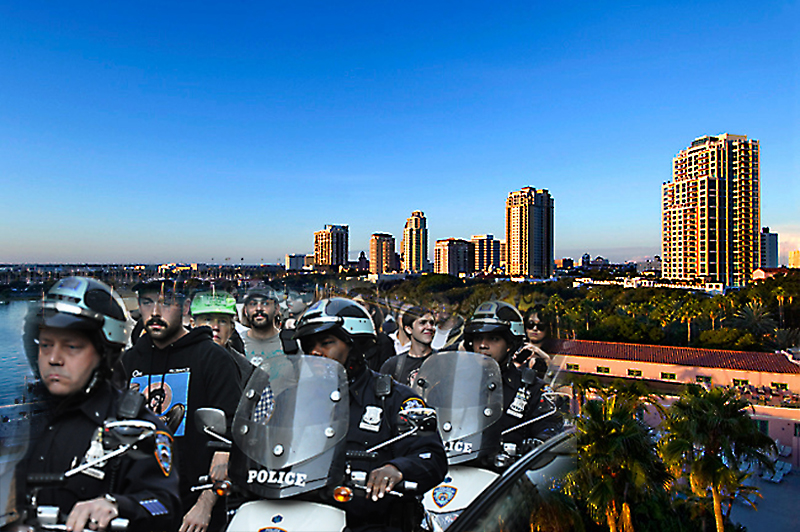 So something is indeed happening, Mr. Jones, and as Sawant said, “We have an entire world to win.”
So something is indeed happening, Mr. Jones, and as Sawant said, “We have an entire world to win.”
— Jeff Roby
Rose Roby
06/28/14

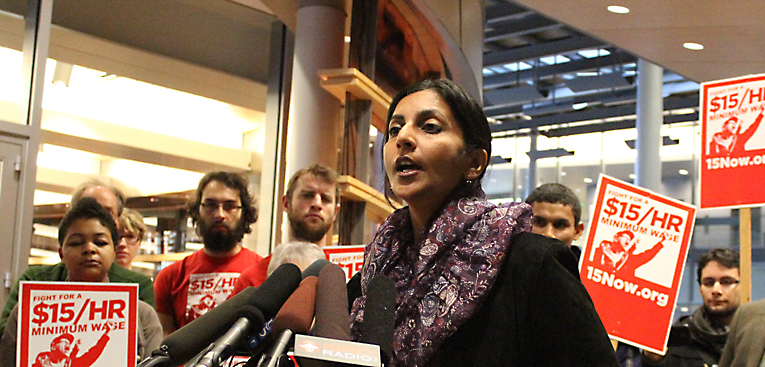


[…] out this article from the Green Party of St. Petersburg on the 15Now […]